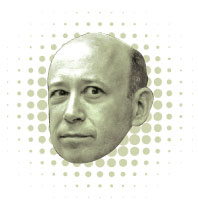
They may be teaching creationism in Tennessee, but Wall Street is and always has been a place where, in the long term, only the fittest survive. Granted, the short term can seem awfully long: Take the last five years or so, when it seemed like any bozo in a pin-striped suit could make a seven-figure salary just by turning up for work at an investment bank. The rest of us could do little but scratch our heads and wonder just how so many people could be worth such large paychecks. Turns out they weren’t. Whether it was derived from a hedge fund at Bear Stearns gorging itself on overpriced mortgage securities or Citigroup’s pulling Enron-like balance-sheet moves with so-called SIVs, the mirage of inexorably rising profits did indeed last for a time. But the bill for the credit bubble has come due, and the list of those unmasked as not worth their gargantuan paydays lengthens by the week: Chuck Prince of Citigroup, Stan O’Neal of Merrill Lynch, Warren Spector of Bear Stearns, and a veritable army of hedge-fund managers you’ve never heard of and probably never will. The names you will keep hearing are the ones below—those who did earn their keep in 2007. It’s a short list. When you don’t have a low-interest-rate, liquidity-driven tailwind at your back, you’ve got to actually come up with a smart idea, or a cynically self-interested one. And smart ideas, at least, haven’t been that common on Wall Street of late.
LLOYD BLANKFEIN, CEO, Goldman Sachs
In Blankfein’s turn at the top of Wall Street’s most rarefied money machine, Goldman Sachs has not only continued to rake in record profits but also somehow dodged the mortgage meltdown. In this year’s third quarter, when pretty much every other bank was marking down hard-to-value financial instruments on their balance sheets, Goldman booked a gain of $2.62 billion.
JOHN PAULSON, founder, Paulson & Co.
One of the few on Wall Street to not only question the exuberance in the credit markets but also take a position against it. In retrospect, his insight seems a little, well, obvious. Many investors were buying the riskiest portions of packaged mortgages for a mere one percent gain over going interest rates. By shorting, or betting against those bonds, his risk profile was thus: If he was wrong, he could lose that one percent. If he was right, he could make 100 percent. And he was right. Paulson has reportedly turned a $500 million bet into $3.6 billion in 2007 alone. Investors have flocked to his hedge fund, taking it from the 69th largest at the start of the year to one of the top ten.
MEREDITH WHITNEY, analyst, CIBC World Markets
Whitney is one of a very rare breed: an equity analyst who gave honest bad news about the stock of a major firm. On October 31, even after the bank had taken a $6.5 billion writedown, she issued a report that said Citigroup was undercapitalized and would likely be forced to cut its dividend. And she downgraded its stock to the equivalent of “sell.” When investors grasped the implications of the call, it wasn’t only Citi’s stock that took a hit: The entire market experienced a $369 billion sell-off.
JOHN MACK, CEO, Morgan Stanley
After Morgan Stanley’s disastrous third quarter, in which it took a $940 million markdown on leveraged loans and a $480 million hit in computerized stock trading, Mack had a brainstorm—sacrifice someone at the altar of those losses before he took the hit himself. His choice? The highest-ranking woman on Wall Street: Morgan Stanley co-president Zoe Cruz.
THOMAS DINAPOLI, comptroller, New York State
In May 2006, the New York State Common Retirement Fund invested $447,000 in a music company called Pump Audio. It was bought out just over a year later for some $42 million, earning the fund, which DiNapoli ultimately oversees, a 500 percent return on its investment. Overall, the fund pulled in an impressive 12.6 percent return, in part owing to aggressive investments in international stocks, real estate, and “alternative” assets like private equity.
PHILIP FALCONE, founder, Harbinger Capital Partners
Largely viewed as a third-rate trader early in his career, Falcone placed a large bet on the mortgage meltdown and, as a result, looks to bring in the second-largest payday among hedge-fund managers this year, well north of $1 billion. In February, Harbinger’s “distressed” debt vehicle had 60 percent of its assets in so-called short positions that would profit if mortgage pools lost value, versus just 35 percent historically. The doubling-down was prescient—and profitable.
HENRY KRAVIS, KKR
STEPHEN SCHWARZMAN, Blackstone Group
LEON BLACK, Apollo Management
After helping to saddle numerous banks with some $300 billion in leveraged-buyout debt that suddenly didn’t seem as valuable come the credit crunch, these three private-equity titans turned around and decided to raise funds to buy that same debt off their bankers—at a discount. A KKR marketing brochure suggested the “opportunity” offered potential 20 percent– plus returns, and the firm was looking to raise some $2.5 billion, on top of which it might … yes, that’s right … borrow another $10 billion to invest.

22.
“I love New York because the waiters and waitresses are the most beautiful, interesting, creative, stylish, aloof, and driven collection of service providers that can be found anywhere on this planet. They all have a story. They all have a plan. And they all forgot to bring me the fucking mustard.”
—Julian Swearengin
23.
“I love New York because in a city filled with 8 million people, you can still run into your crazy ex-stepmother in a deli in Times Square.”
—Elizabeth Ozemebhoy